Category:144 Practical Operations: Difference between revisions
new article |
m →144.2 Signing Operations Changes: updated link |
||
| Line 51: | Line 51: | ||
|} | |} | ||
==144.2 [[:Category:903 Highway Signing|Signing Operations]] Changes== | ==144.2 [[:Category:903 Highway Signing#MoDOT 5-Year Plan for Signing – Practical Operations|Signing Operations]] Changes== | ||
{| style="margin: 1em auto 1em auto" align="right" | {| style="margin: 1em auto 1em auto" align="right" | ||
|- | |- | ||
Revision as of 10:22, 24 January 2011
Because of dramatically constrained revenues, MoDOT will do more quality work with fewer resources. MoDOT will:
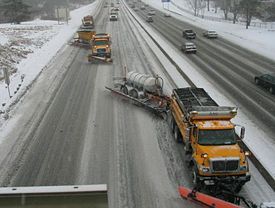
- Honor commitments in the STIP
- Keep major roads in good condition
- Improve condition of minor roads
- Hold our own on bridges so their condition does not get worse
- Maintain high customer satisfaction
The operations departments will make internal operations more efficient. MoDOT has a new direction in five major areas of work including snow removal, striping, signing, mowing and pavement maintenance. All savings from these operational changes will be used to preserve MoDOT’s high customer satisfaction by keeping our major roads in good condition by producing more quality work on pavements, improving minor roads and maintaining bridges so their conditions don’t get worse.
144.1 Winter Operations Changes
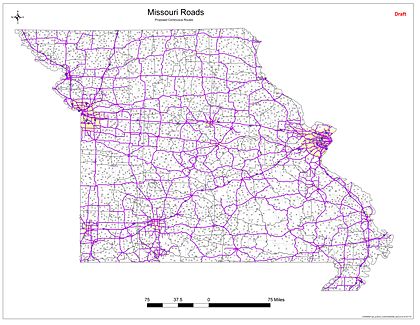
| District 1 | District 2 | District 3 | ||
| District 4 | District 5 | District 6 | ||
| District 7 | District 8 | District 9 | ||
| District 10 |
“Continuous Operations” definition has been revised by reprioritizing the roads for regional significance. A route needs to be a major route or have an AADT of at least 2500 to receive treatment as a “Continuous Operations Route”, as shown in the map to the right. Continuous operations will be performed until roads are mostly clear. Crews will return next working day and continue fight where progress can be made. Emergency crews are to be ready to handle overnight refreeze/slick spots.
"Non-Continuous Operations Routes” (typically, low volume minor routes), will be plowed open to two-way traffic. Hills, curves and intersections will be treated as needed.
There are five types of winter events:
- Type 5 – Frost, flurries, freezing fog, blowing snow and refreeze
- Type 4 – Dusting to 1 in. of snow, sleet, or other frozen precipitation
- Type 3 – 1 in. to 6 in. of snow/frozen precipitation in 24 hours OR a trace to ½ in. of ice
- Type 2 – 6 to 12 in. of snow in 24 hours or ½ to ¾ in. ice
- Type 1 – More than 12 in. of snow in 24 hours or more than ¾ in. ice
The truck fleet will be reduced over three years and the use of salt will also be reduced. MoDOT will continue to plow snow and treat roads and focus efforts on making roads safe and passable. Practical Operations will efficiently attack each storm by providing statewide consistency.
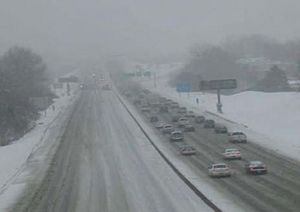 |
 |
 |
 |
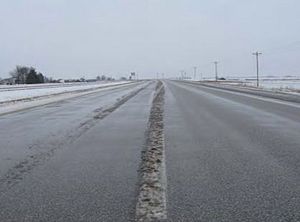 |
 |
 |
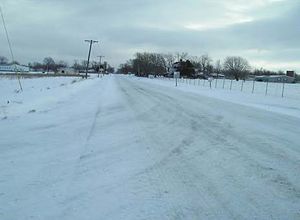 |
144.2 Signing Operations Changes
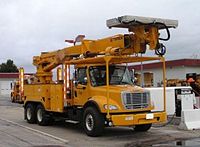 |
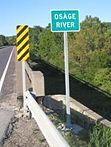
|
MoDOT will significantly reduce sign and post inventories by replacing only “bad” or “needed” signs and permitting wood posts on low volume roads. Nighttime sign inspections will be conducted annually. The plumb criteria will be revised for minor road signs. MoDOT will use the minimum size signpost necessary to support the sign and will reuse structural posts and bases when possible. Also, MoDOT will design new signs to fit existing bases and posts, where possible.
Signing and striping crews will be combined in all the districts and large equipment will be regionalized. In early 2012, the Sign Management System will be used to streamline the management and ordering process.
144.3 Striping Operations Changes
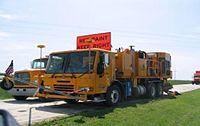 |

|
Every major road will be restriped before Memorial Day and every “Regionally significant” minor road after Memorial Day. Fifty per cent of the remaining minor roads will be striped every year. One paint and bead system will be used on edge lines. Two crews per striper will be utilized. Quality striping will be maintained even while the use of 3M reflective tape will be phased out.
Signing and striping crews will be combined in all the districts and the striper fleet will be reduced over three years.
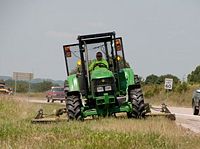 |
144.4 Mowing Operations Changes
Sight distance mowing will be maintained on all roads for safety. All major routes will be mowed prior to Memorial Day, July Fourth and Labor Day. For minor routes, plant growth regulators will be used to reduce mowing. Final mowing of the season will be every year on major routes and every other year on minor routes and will be 30 ft. wide on all roads.
Contract mowing will be reduced to only where specialty equipment is needed. The tractor fleet and mower attachments will be reduced over two years.
144.5 Pavement Operations Changes
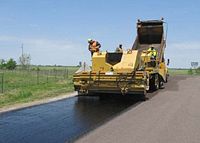 |
Resources will be redirected for additional pavement work to maintain major routes and improve minor routes. The pavement planning tool will be used for future work plans and the pavement options chart used to estimate the appropriate pavement structure. The modified pavement rating system is available. Fog seals/fly coat are not required on minor roads with less than 400 AADT. Professional-looking joint and crack sealing is encouraged.
A smooth ride is to be created and preventive maintenance (see EPG 413 and EPG 570.2) is to keep the roads looking good. MoDOT will track which treatments work best for future planning and will be responsive to customer expectations.
Articles in "144 Practical Operations"
This category contains only the following page.